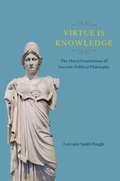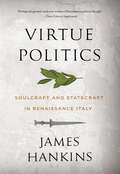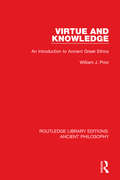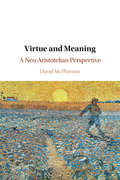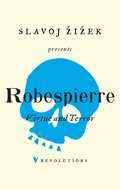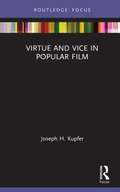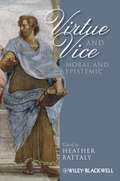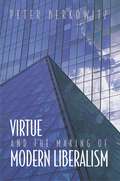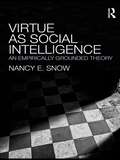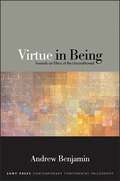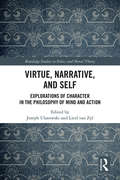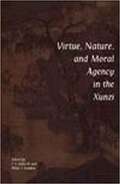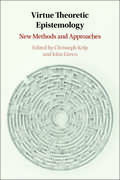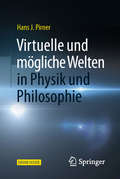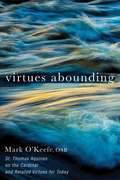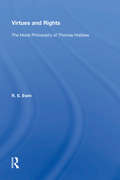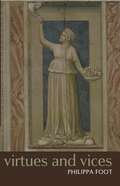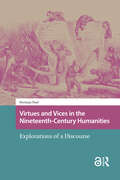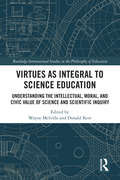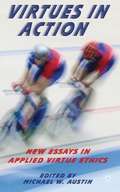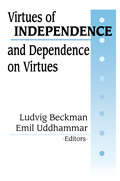- Table View
- List View
Virtue Is Knowledge: The Moral Foundations of Socratic Political Philosophy
by Lorraine Smith PangleThe relation between virtue and knowledge is at the heart of the Socratic view of human excellence, but it also points to a central puzzle of the Platonic dialogues: Can Socrates be serious in his claims that human excellence is constituted by one virtue, that vice is merely the result of ignorance, and that the correct response to crime is therefore not punishment but education? Or are these assertions mere rhetorical ploys by a notoriously complex thinker? Lorraine Smith Pangle traces the argument for the primacy of virtue and the power of knowledge throughout the five dialogues that feature them most prominently—the Apology, Gorgias, Protagoras, Meno, and Laws—and reveals the truth at the core of these seemingly strange claims. She argues that Socrates was more aware of the complex causes of human action and of the power of irrational passions than a cursory reading might suggest. Pangle’s perceptive analyses reveal that many of Socrates’s teachings in fact explore the factors that make it difficult for humans to be the rational creatures that he at first seems to claim. Also critical to Pangle’s reading is her emphasis on the political dimensions of the dialogues. Underlying many of the paradoxes, she shows, is a distinction between philosophic and civic virtue that is critical to understanding them. Ultimately, Pangle offers a radically unconventional way of reading Socrates’s views of human excellence: Virtue is not knowledge in any ordinary sense, but true virtue is nothing other than wisdom.
Virtue Politics: Soulcraft and Statecraft in Renaissance Italy
by James HankinsJames Hankins challenges the view that the Renaissance was the seedbed of modern republicanism, with Machiavelli as exemplary thinker. What most concerned Renaissance political theorists, Hankins contends, was not reforming laws but shaping citizens. To secure the social good, they fostered virtue through a new program of education: the humanities.
Virtue and Knowledge: An Introduction to Ancient Greek Ethics (Routledge Library Editions: Ancient Philosophy #6)
by William J. PriorOriginally published in 1991, this book focuses on the concept of virtue, and in particular on the virtue of wisdom or knowledge, as it is found in the epic poems of Homer, some tragedies of Sophocles, selected writings of Plato, Aristotle, and the Stoic and Epicurean philosophers. The key questions discussed are the nature of the virtues, their relation to each other, and the relation between the virtues and happiness or well-being. This book provides the background and interpretative framework to make classical works on Ethics, such as Plato’s Republic and Aristotle’s Nicomachean Ethics, accessible to readers with no training in the classics.
Virtue and Knowledge: An Introduction to Ancient Greek Ethics (Routledge Library Editions: Ancient Philosophy)
by William J. PriorOriginally published in 1991, this book focuses on the concept of virtue, and in particular on the virtue of wisdom or knowledge, as it is found in the epic poems of Homer, some tragedies of Sophocles, selected writings of Plato, Aristotle, and the Stoic and Epicurean philosophers. The key questions discussed are the nature of the virtues, their relation to each other, and the relation between the virtues and happiness or well-being. This book provides the background and interpretative framework to make classical works on Ethics, such as Plato’s Republic and Aristotle’s Nicomachean Ethics, accessible to readers with no training in the classics.
Virtue and Meaning: A Neo-Aristotelian Perspective
by David McPhersonThe revival of Aristotelian virtue ethics can be seen as a response to the modern problem of disenchantment, that is, the perceived loss of meaning in modernity. However, in Virtue and Meaning, David McPherson contends that the dominant approach still embraces an overly disenchanted view. In a wide-ranging discussion, McPherson argues for a more fully re-enchanted perspective that gives better recognition to the meanings by which we live and after which we seek, and to the fact that human beings are the meaning-seeking animal. In doing so, he defends distinctive accounts of the relationship between virtue and happiness, other-regarding demands, and the significance of linking neo-Aristotelian virtue ethics with a view of the meaning of life and a spiritual life where contemplation has a central role. This book will be valuable for philosophers and other readers who are interested in virtue ethics and the perennial question of the meaning of life.
Virtue and Terror
by Maximilien Robespierre John Howe Slavoj Zizek Jean DucangeRobespierre’s justification of the Terror in the French RevolutionRobespierre’s defence of the French Revolution remains one of the most powerful and unnerving justifications for political violence ever written. It has an extraordinary resonance in a world obsessed with terrorism and appalled by the language of its proponents. Yet today the French Revolution is celebrated as the event which gave birth to a nation built on the principles of Enlightenment. So how should a contemporary audience approach Robespierre’s vindication of revolutionary terror? i ek’s introduction analyzes these contradictions with a prodigious breadth of analogy and reference.
Virtue and Vice in Popular Film (Routledge Focus on Film Studies)
by Joseph H. KupferThis book addresses a prominent group of virtues and vices as portrayed in popular films to further our understanding of these moral character traits. The discussions emphasize the interplay between the philosophical conception of the virtues and vices and the cinematic representations of character. Joseph H. Kupfer explores how fictional characters possessing certain moral strengths and weaknesses concretize our abstract understanding of them. Because the actions that flow from these traits occur in cinematic contexts mirroring real world conditions, the narrative portrayals of these moral characteristics can further our appreciation of their import. Humility, integrity, and perseverance, for example, are depicted in Chariots of Fire, The Fabulous Baker Boys, and Billy Elliot, while the vices of envy, arrogance and vanity are captured in Amadeus, Whiplash, and Young Adult. This interdisciplinary work in philosophy and film criticism will be of great interest to scholars and students of film studies, philosophy of film, ethics, aesthetics, and popular culture.
Virtue and Vice, Moral and Epistemic (Metaphilosophy #13)
by Heather BattalyVirtue and Vice, Moral and Epistemic presents a series of essays by leading ethicists and epistemologists who offer the latest thinking on the moral and intellectual virtues and vices, the structure of virtue theory, and the connections between virtue and emotion. Cuts across two fields of philosophical inquiry by featuring a dual focus on ethics and epistemology Features cutting-edge work on the moral and intellectual virtues and vices, the structure of virtue theory, and the connections between virtue and emotion Presents a radical new moral theory that makes exemplars the foundation of ethics; and new theories of epistemic vices such as epistemic malevolence and epistemic self-indulgence Represents one of the few collections to address both the moral virtues and the epistemic virtues Explores a new approach in epistemology - virtue epistemology - which emphasizes the importance of intellectual character traits
Virtue and the Making of Modern Liberalism (New Forum Books #23)
by Peter BerkowitzVirtue has been rediscovered in the United States as a subject of public debate and of philosophical inquiry. Politicians from both parties, leading intellectuals, and concerned citizens from diverse backgrounds are addressing questions about the content of our character. William Bennett's moral guide for children, A Book of Virtues, was a national bestseller. Yet many continue to associate virtue with a prudish, Victorian morality or with crude attempts by government to legislate morals. Peter Berkowitz clarifies the fundamental issues, arguing that a certain ambivalence toward virtue reflects the liberal spirit at its best. Drawing on recent scholarship as well as classical political philosophy, he makes his case with penetrating analyses of four central figures in the making of modern liberalism: Hobbes, Locke, Kant, and Mill. These thinkers are usually understood to have neglected or disparaged virtue. Yet Berkowitz shows that they all believed that government resting on the fundamental premise of liberalism--the natural freedom and equality of all human beings--could not work unless citizens and officeholders possess particular qualities of mind and character. These virtues, which include reflective judgment, sympathetic imagination, self-restraint, the ability to cooperate, and toleration do not arise spontaneously but must be cultivated. Berkowitz explores the various strategies the thinkers employ as they seek to give virtue its due while respecting individual liberty. Liberals, he argues, must combine energy and forbearance, finding public and private ways to support such nongovernmental institutions as the family and voluntary associations. For these institutions, the liberal tradition powerfully suggests, play an indispensable role not only in forming the virtues on which liberal democracy depends but in overcoming the vices that it tends to engender. Clearly written and vigorously argued, this is a provocative work of political theory that speaks directly to complex issues at the heart of contemporary philosophy and public discussion. New Forum Books makes available to general readers outstanding, original, interdisciplinary scholarship with a special focus on the juncture of culture, law, and politics. New Forum Books is guided by the conviction that law and politics not only reflect culture, but help to shape it. Authors include leading political scientists, sociologists, legal scholars, philosophers, theologians, historians, and economists writing for nonspecialist readers and scholars across a range of fields. Looking at questions such as political equality, the concept of rights, the problem of virtue in liberal politics, crime and punishment, population, poverty, economic development, and the international legal and political order, New Forum Books seeks to explain--not explain away--the difficult issues we face today.
Virtue as Social Intelligence: An Empirically Grounded Theory
by Nancy E. SnowVirtue as Social Intelligence: An Empirically Grounded Theory takes on the claims of philosophical situationism, the ethical theory that is skeptical about the possibility of human virtue. Influenced by social psychological studies, philosophical situationists argue that human personality is too fluid and fragmented to support a stable set of virtues. They claim that virtue cannot be grounded in empirical psychology. This book argues otherwise. Drawing on the work of psychologists Walter Mischel and Yuichi Shoda, Nancy E. Snow argues that the social psychological experiments that philosophical situationists rely on look at the wrong kinds of situations to test for behavioral consistency. Rather than looking at situations that are objectively similar, researchers need to compare situations that have similar meanings for the subject. When this is done, subjects exhibit behavioral consistencies that warrant the attribution of enduring traits, and virtues are a subset of these traits. Virtue can therefore be empirically grounded and virtue ethics has nothing to fear from philosophical situationism.
Virtue in Being: Towards an Ethics of the Unconditioned (SUNY series in Contemporary Continental Philosophy)
by Andrew BenjaminIn his last book, Towards a Relational Ontology, Andrew Benjamin provided a philosophical account of what he terms anoriginal relationality, demonstrating how this concept can be seen to be at work throughout the history of philosophy. In Virtue in Being, he builds on that project to argue for a new way of understanding the relationship between ontology and ethics through insightful readings of texts by Immanuel Kant, Hannah Arendt, and Jacques Derrida. Structuring the book around the themes of violence, evil, and pardon, Benjamin builds a convincing case for the connections he draws between thinkers not commonly associated with one another.
Virtue in Business
by Edwin M. HartmanThe virtue approach to business ethics is a topic of increasing importance within the business world. Focusing on Aristotle's theory that the virtues of character, rather than actions, are central to ethics, Edwin Hartman introduces readers of this book to the value of applying Aristotle's virtue approach to business. Using numerous real-world examples, he argues that business leaders have good reason to take character seriously when explaining and evaluating individuals in organisations. He demonstrates how the virtue approach can deepen our understanding of business ethics, and how it can contribute to contemporary discussions of character, rationality, corporate culture, ethics education and global ethics. Written by one of the foremost Aristotelian scholars working in the field today, this authoritative introduction to the role of virtue ethics in business is a valuable primer for graduate students and academic researchers in business ethics, applied ethics and philosophy.
Virtue, Narrative, and Self: Explorations of Character in the Philosophy of Mind and Action (Routledge Studies in Ethics and Moral Theory)
by Joseph Ulatowski; Liezl van ZylVirtue, Narrative, and Self connects two philosophical areas of study that have long been treated as distinct: virtue theory and narrative accounts of personal identity. Chapters address several important issues and neglected themes at the intersection of these research areas. Specific examples include the role of narrative in the identification, differentiation, and cultivation of virtue, the nature of practical reasoning and moral competence, and the influence of life’s narrative structure on our conceptions of what it means to live and act well. This volume demonstrates how recent work from the philosophy of mind and action concerning narrativity and our understanding of the self can shed new light on questions about the nature of virtue, practical wisdom, and human flourishing. This book will be of interest to scholars and advanced students working in virtue theory, moral philosophy, philosophy of mind and action, and moral education.
Virtue, Nature, and Moral Agency in the Xunzi
by Philip J. Ivanhoe T. C. KlineXunzi is traditionally identified as the third philosopher in the Confucian tradition, after Confucius and Mencius. Unlike the work of his two predecessors, he wrote complete essays in which he defends his own interpretation of the Confucian position and attacks the positions of others. Within the early Chinese tradition, Xunzi's writings are arguably the most sophisticated and philosophically developed. This richness of philosophical content has led to a lively discussion of his philosophy among contemporary scholars. This volume collects some of the most accessible and important contemporary essays on the thought of Xunzi, with an Introduction that provides historical background, philosophical context, and relates each of the selections to Xunzi's philosophy as a whole and to the themes of virtue, nature, and moral agency. These themes are also discussed in relation to Western philosophical concerns.
Virtue-Theoretic Epistemology: New Methods and Approaches
by Christoph Kelp John GrecoVirtue epistemology is one of the most flourishing research programmes in contemporary epistemology. Its defining thesis is that properties of agents and groups are the primary focus of epistemic theorising. Within virtue epistemology two key strands can be distinguished: virtue reliabilism, which focuses on agent properties that are strongly truth-conducive, such as perceptual and inferential abilities of agents; and virtue responsibilism, which focuses on intellectual virtues in the sense of character traits of agents, such as open-mindedness and intellectual courage. This volume brings together ten new essays on virtue epistemology, with contributions to both of its key strands, written by leading authors in the field. It will advance the state of the art and provide readers with a valuable overview of what virtue epistemology has achieved.
Virtuelle und mögliche Welten in Physik und Philosophie
by Hans J. PirnerWas sind mögliche Welten und was haben Entwicklungen der modernen Physik mit Ideen über mögliche Welten in der Philosophie zu tun? In der Beantwortung dieser Fragen entwickelt das vorliegende Werk das wissenschaftliche Weltbild im Vergleich mit möglichen Welten und gelangt so zu einem besseren Verständnis unserer einzigen wirklichen Welt. Dazu beschreibt der Autor die kreativen Ideen, die zur klassischen Physik, zur Quantenphysik und zur Erforschung des Ursprungs des Weltalls geführt haben. Er lädt den Leser ein, mit ihm über die Versuche in der modernen Physik nachzudenken, Parallelwelten und neue Universen einzuführen. Man erfährt, wie in Physik und Philosophie mögliche Welten als Instrumente verwendet werden, um unsere Erkenntnisse zu erweitern. Es wird erläutert, wie man sich mögliche Welten auch außerhalb der Physik vorzustellen hat und welchen Anforderungen diesen genügen. Unter diesem Gesichtspunkt analysiert der Autor abschließend die Zukunftsvisionen der Science-Fiction Literatur und die neuesten Erkenntnisse über künstliche, virtuelle und hybride Welten. Anhänge mit vertieftem physikalischen Hintergrund und ein ausführliches Glossar unterstützen die interessierten Lesern und Leserinnen dabei, einen Überblick über die vielfältigen Begriffe und Sachverhalte zu behalten.
Virtues Abounding: St. Thomas Aquinas On the Cardinal and Related Virtues for Today
by Mark O'KeefeThis book explores, in contemporary language, the practical insights that Aquinas offers for the moral life today. Whether in university, seminary, or adult faith formation settings—whether for a deeper intellectual understanding of virtues or for personal reflection and growth—Virtues Abounding will provide new insight into a classic but too often overlooked storehouse of moral riches.
Virtues And Rights: The Moral Philosophy Of Thomas Hobbes
by R. E. EwinThis book is a timely interpretation of the moral and political philosophy of Thomas Hobbes. Staying close to Hobbes's text and working from a careful examination of the actual substance of the account of natural law, R. E. Ewin argues that Hobbes well understood the importance of moral behavior to civilized society. This interpretation stands as a much-needed corrective to readings of Hobbes that emphasize the rationally calculated, self-interested nature of human behavior. It poses a significant challenge to currently fashionable game theoretic reconstructions of Hobbesian logic. It is generally agreed that Hobbes applied what he took to be a geometrical method to political theory. But, as Ewin forcefully argues, modem readers have misconstrued Hobbes's geometric method, and this has led to a series of misunderstandings of Hobbes's view of the relationship between politics and morality. Important implications of Ewin's reading are that Hobbes never thought that "the war of each against all" was an empirical possibility for citizens; that his political theory actually presupposes moral agency; and that Hobbes's account of natural law forces us to the conclusion that Hobbes was a virtue theorist. This major contribution to Hobbes studies will be praised and criticized, welcomed and challenged, but it cannot be ignored. All philosophers, political theorists, and historians of ideas dealing with Hobbes will need to take account of it.
Virtues and Vices and Other Essays in Moral Philosophy
by Philippa FootPhilippa Foot is regarded as standing out among contemporary ethical theorists because of her conviction that virtues and vices are more central ethical notions than rights, duties, justice, or consequences. This book collects 12 of her essays published between 1957-77 and two new ones. This collection of essays contains discussions of the moral philosophy of David Hume, Immanuel Kant, Friedrich Nietzsche, and some modern philosophers. It presents virtues and vices rather than rights and duties as the central concepts in moral philosophy. Throughout, the author rejects contemporary anti‐ naturalistic moral philosophies such as emotivism and prescriptivism, but defends the view that moral judgements may be hypothetical rather than (as Kant thought) categorical imperatives. The author also applies her moral philosophy to the current debates on euthanasia and abortion, the latter discussed in relation to the doctrine of the double effect. She argues against the suggestion, on the part of A. J. Ayer and others, that free will actually requires determinism. In a final essay, she asks whether the concept of moral approval can be understood except against a particular background of social practices.
Virtues and Vices in the Nineteenth-Century Humanities: Explorations of a Discourse (Studies in the History of Knowledge)
by Herman PaulWhat do scholars do when they talk about virtues (impartiality, accuracy) or vices (dogmatism, prejudice)? Against the common view that such high-minded talk is largely irrelevant to actual scholarly practice, this volume proposes to treat it as a practice in its own right. Drawing on case studies from the nineteenth-century humanities (with occasional forays into physics, chemistry, and medicine), Paul shows that notions of virtue and vice were an evaluative discourse used across the academic spectrum. Paul argues that this evaluative idiom is best studied from a rhetorical point of view, with due attention to repertoires on which scholars drew, explicit or implicit appeals to authority, multi-layered meanings of virtue and vice terms, different uses to which these concepts were put, and societal contexts that lent plausibility to scholars' invocations of virtue and vice. Based on more than a decade of research, this volume will be a key reference for scholars interested in virtues, vices, and the history of the humanities.
Virtues as Integral to Science Education: Understanding the Intellectual, Moral, and Civic Value of Science and Scientific Inquiry (Routledge International Studies in the Philosophy of Education)
by Wayne Melville; Donald KerrBy investigating the re-emergence of intellectual, moral, and civic virtues in the practice and teaching of science, this text challenges the increasing professionalization of science; questions the view of scientific knowledge as objective; and highlights the relationship between democracy and science. Written by a range of experts in science, the history of science, education and philosophy, the text establishes the historical relationship between natural philosophy and the Aristotelian virtues before moving to the challenges that the relationship faces, with the emergence, and increasing hegemony, brought about by the professionalization of science. Exploring how virtues relate to citizenship, technology, and politics, the chapters in this work illustrate the ways in which virtues are integral to understanding the values and limitations of science, and its role in informing democratic engagement. The text also demonstrates how the guiding virtues of scientific inquiry can be communicated in the classroom to the benefit of both individuals and wider societies. Scholars in the fields of Philosophy of Science, Ethics and Philosophy of Education, as well as Science Education, will find this book to be highly useful.
Virtues from Hell: Survivors of Conflicts and the Reconstruction-Reconciliation Processes (Philosophy and Politics - Critical Explorations #20)
by Fidèle IngiyimbereThis book offers a critical examination of certain ideas and values—such as remembering, forgiveness, story-telling through Truth and Reconciliation Commissions, etc.—that under-gird the transitional practices and mechanisms of societies emerging from conflicts. It does so by making the survivors’ experience the supreme and ultimate judge of the legitimacy of such practices. While many scholars have dealt with these topics, this book provides a unique perspective on them by using personal stories, narratives and memoirs of the survivors as a checking point of the theoretical elaboration of these ideas and values. By means of an existential phenomenological analysis of the situation of survivors of gross human rights violations, the book assesses how many resources are still available to them, so that they can contribute to the processes of reconstruction and reconciliation of their societies. This analysis constitutes the background for reading the rest of the book, which challenges some assumptions and presumptions of transitional practices such as healing through truth-telling, or providing justice through reparations. It does so by presenting nuanced suggestions on the ways survivors can participate in the reconstruction-reconciliation processes, without jeopardizing their own well-being.
Virtues in Action
by Michael W. AustinIn recent decades, many philosophers have considered the strengths and weaknesses of a virtue-centered approach to moral theory. Much less attention has been given to how such an approach bears on issues in applied ethics. The essays in this volume apply a virtue-centered perspective to a variety of contemporary moral issues, and in so doing offer a fresh and illuminating perspective. Some of the essays focus on a particular virtue and its application to one or more realms of applied ethics, such as temperance and sex or humility and environmental ethics. Other chapters focus on an issue in applied ethics and bring several virtues into a discussion of that issue or realm of life, such as sport, education, and business. Finally, several of the chapters engage relevant psychological research as well as current neuroscience, which enhances the strength of the philosophical arguments.
Virtues of Independence and Dependence on Virtues
by Ludvig Beckman Emil UddhammarDebate about the concept of virtue is a persistent theme in academic discourse. One strand of thinking attempts to examine and reconstruct ethical theories with the aim of formulating a new morality or ethics. A second strand of thought, more strongly represented in this work, attempts to explore the social and political world deploying the concept of virtue. Thus, this volume crosses the established borders of academic disciplines in order to provide a richer and more comprehensive understanding of the place of virtues in contemporary western societies.The editors hold that the dominating virtue of our culture and society is the virtue of independence. Yet independence, or individual autonomy, is contingent upon a diverse, and so far ill-understood, set of cultural, biological, economic, ethical, and political practices. The idea of individuality is in other words supervening on a web of formal and informal relations. This volume therefore attempts to improve our understanding of the prevailing ethos of independence as well as of the mechanisms and practices sustaining it.Virtues are examined in specific contexts. Authors explore what we can learn about our dependence on virtues from the archaic Greek culture. They examine the relevance of virtue-ethics to the understanding of day-to-day practices. And they look at the place of virtues in understanding the norms of independence and liberty. Other contributions attend to the virtues of independence and its challenges, examining possible philosophical challenges, questioning whether independence is always a virtue, and how the virtues of justice fare given a commitment to the virtues of independence.The final portion of the book explore the empirical consequences of the virtues of independence. Among the questions addressed are how personal independence affects political and economic institutions, and the connections between norms of independence and the growth of modernity. This volume is an important contribution to contemporary understanding of what constitutes virtuous and ethical behavior.
Virtues of The Mind
by Linda Trinkaus ZagzebskiAlmost all theories of knowledge and justified belief employ moral concepts and forms of argument borrowed from moral theories, but none of them pay attention to the current renaissance in virtue ethics. This remarkable book is the first attempt to establish a theory of knowledge based on the model of virtue theory in ethics. The book develops the concept of an intellectual virtue, and then shows how the concept can be used to give an account of the major concepts in epistemology, including the concept of knowledge. This highly original work of philosophy for professionals will also provide students with an excellent introduction to epistemology, virtue theory, and the relationship between ethics and epistemology.
